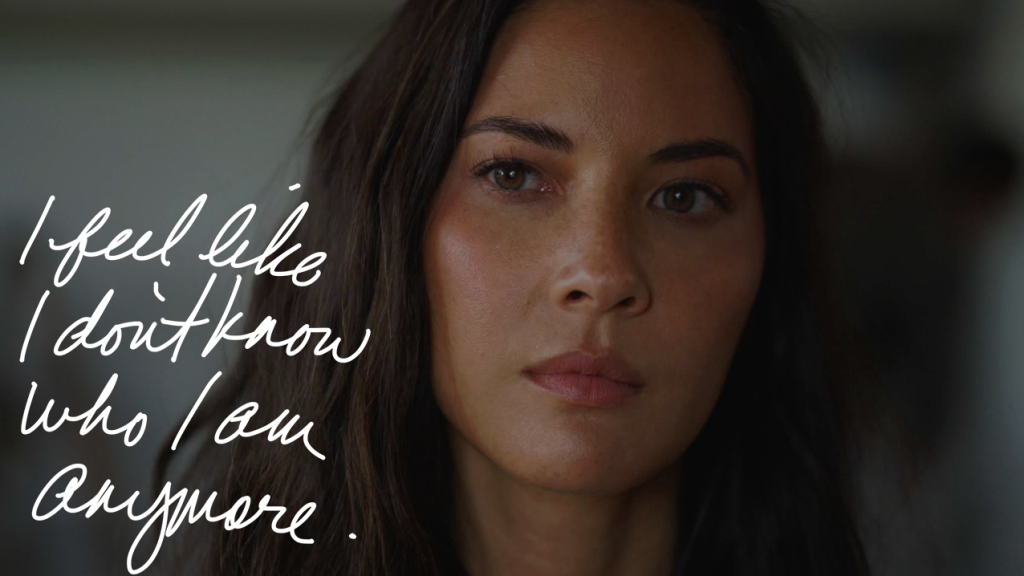Olivia Munn as “Violet” in Justine Bateman’s directorial feature film debut. | Credit: Mark Williams
It is mostly a universal experience to have some level of self-doubt when approaching particular events in your life that may put you out of your comfort zone. It is quite another thing to have a pernicious voice in your head that seeks to break you down to the smallest version of yourself. This is anxiety and self-loathing that puts you at odds with your own brain to destroy your sense of self. Those who have had the misfortune of grappling with this will be able to identify the experience perfectly. While not a gendered experience, the patriarchal society in which we live would probably tip the scale to the side of women dealing with this more often. Although, most women likely do not have Justin Theroux (The Leftovers) supplying said voice as is the case in Justine Bateman’s audacious debut feature film Violet. The psychology of men has been explored on numerous occasions, but rarely has a feature film explored the nuances of a woman’s internal experience as unflinchingly as this essential film. Honestly, it might hit home too hard for some.
Violet (Olivia Munn) would appear to be a woman who has her life together from the outside. She is a successful film development executive at a burgeoning boutique agency. She has the respect of her peers around town as a brilliant creative force. She has all of the material trappings that come with such a lifestyle. Yet, she does not have the confidence that you would assume comes with such a position. This is thanks largely to the volatile voice that resides in her head to tell her everything she is doing wrong and how she will completely wreck her life if she attempts to deviate from the natural order of things. There are the quick jabs such as “You look like a pig” when she is eating a sugary treat for breakfast as well as the foundational toxic elements that affect how she interacts with others. Violet makes herself small when her subordinates take advantage of her, offering a heartbreaking “If I’m quiet, it’s better” when her assistant presses her on the issue.
Violet does not want to be this way. While the voice brow beats her into accepting her unsatisfying life, her real feelings come through on screen in the form of scribbled text with thoughts such as “Why can’t I be happy?” peeking through. While this type of artistic flourish could seem hokey in another project, Bateman yields it with such precision that the film would not function as well without it. The balancing act of the voice with the internal thoughts, all while Violet is attempting to not dissociate from reality is the type of sensory assault that transports you into this erratic headspace. Her brain is even nice enough to throw in some violent imagery of car crashes and decaying animals to underline the worst case scenarios that could come about if she does not follow the “safe” path.
This internal monologue is not some fantastical outside menace looking to destroy Violet. This is something that any person could be contending with; the imposter syndrome that comes from doubting your own abilities, the impression you have of yourself that makes you feel that you are not enough. Violet accepts that this is the way everyone feels until a helpful friend (Erica Ash) balks at the idea that everyone has a voice constantly cutting them down. This simple admission puts a crack in the mammoth wall she has within herself keeping the anxiety uncomfortably inside. The path to feeling “normal” is not going to be an easy one, but the hope is that Violet will be able to banish this voice once and for all. More than any movie of note, Violet feels like a therapy session brought to compelling life in the best way possible.
The performance from Olivia Munn is not only the strongest work she has delivered to date, but one of the standouts of the year. Violet is a character who easily could have been mishandled in less adept hands, yet Munn brings such nuance and simmering emotion to the character. The “committee” in her head is so loud and abrasive that you almost miss the physicality of what Munn is pulling off, shrinking away at her lowest and slowly growing confident in both speech and stature. She has an impressive ensemble around to complement her as both a help and a hindrance to her emotional evolution. Luke Bracey is a natural favorite as her best friend Red, a charming screenwriter who seems like the natural choice for a partner if not for her brain screaming at her that being with him would be “embarrassing” and ruin her career. He is the type of guy who can sense when not all is right, who does not actually leave when your authentic thoughts are furiously pleading for him not to go. He may not be an A-list Hollywood executive who will guarantee success, but he is worlds better than those such as her contemptuous boss (a wonderfully detestable Dennis Boutsikaris).
The film tackles practicing good mental health in a way that is thematically satisfying without feeling preachy. Many people struggle with setting boundaries in their lives, and this is a one of the key elements of Violet’s journey. An emotionally abusive childhood appears to be the primary source of her emotional struggles, and the toxic family that ties her to that aspect of her past is not something that will be shirked away so easily. Violet has believed the voice when it has said that she is not worthy of love, that she would die alone if she did not accept the meager life she has subjected herself to. What is the likelihood that this is anywhere near the truth, though? Violet expertly traverses such questions and ultimately leaves you with a very cathartic answer. The powerhouse duo of Justine Bateman and Olivia Munn has not only crafted one of the most daring movies of the year, but a film that could genuinely help viewers cast off their own dark cloud.
Violet was viewed in the 2020 Spotlight section of SXSW Online 2021.
Director: Justine Bateman
Writer: Justine Bateman
Rated: NR
Runtime: 92m
Rating: 4.5 out of 5

Dillon is most comfortable sitting around in a theatre all day watching both big budget and independent movies.







